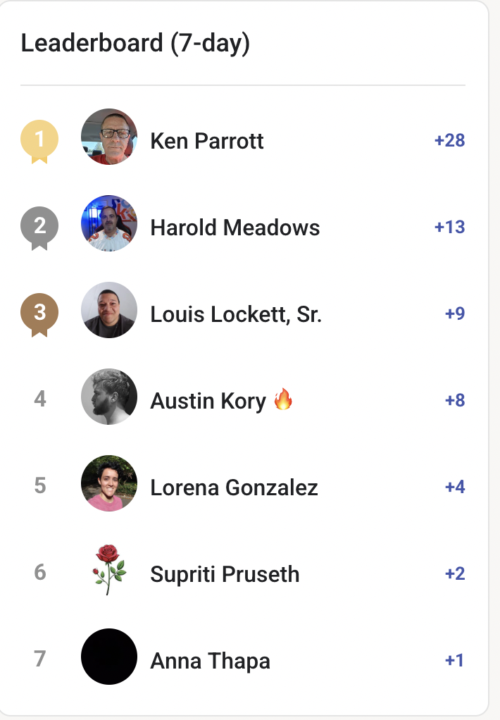Activity
Mon
Wed
Fri
Sun
Oct
Nov
Dec
Jan
Feb
Mar
Apr
May
Jun
Jul
Aug
Sep
What is this?
Less
More
Owned by Austin
Learn to become free of anxiety, depression, ADHD pain or any other condition. Join our supportive community to break free of these struggles together
Memberships
12 contributions to Science Nerd
Topic of the Week Contest: Who will win this week?
Who will win this week? Person with the most activity in the group will win. @Ken Parrott won last week. So, currently it's between @Harold Meadows with +13 points, @Louis Lockett, Sr. with +9 points and @Austin Kory with +8 points. Who will win? Will it be one @Lorena Gonzalez or @Supriti Pruseth come from behind to win???

Random topic of the week: The Chemistry of laziness, fatigue, and procrastination.
“laziness,” “fatigue,” and “procrastination” often feel similar on the surface (not getting things done), they’re chemically and psychologically very different underneath. Here’s the breakdown from a brain chemistry and hormonal perspective: 🧪 CHEMISTRY OF LAZINESS vs. FATIGUE vs. PROCRASTINATION 1. Fatigue = Physiological Exhaustion Definition: Your body or brain is genuinely low on resources (like ATP, glucose, neurotransmitters, sleep, nutrients). Chemistry: - 🔻 Low dopamine (less motivation) - 🔻 Low serotonin (especially with poor sleep or depression) - 🔻 Low ATP/glucose in the brain (mental fog, low drive) - 🔻 High adenosine (sleep pressure builds up) - ⬆️ Possibly elevated cortisol if stress-induced fatigue - ⬇️ Thyroid hormones if hypothyroid (chronic fatigue) Feels like: “I want to move, but I literally can’t.” Fixes: - Sleep - Magnesium, B-complex, protein - Blood sugar balance - Sunlight and circadian rhythm reset - Root cause (anemia, hypothyroid, adrenal fatigue) 2. Procrastination = Emotional Avoidance Definition: You can act, but something in your nervous system is avoiding the task — often due to fear of failure, overwhelm, or perfectionism. Chemistry: - 🧠 Amygdala activation → triggers anxiety/stress response - ⬆️ Cortisol spikes (especially anticipatory stress) - ⬇️ Prefrontal cortex activity (your rational “do the task” center shuts down) - ↕️ Dopamine dysregulation → task feels boring or too hard to start Feels like: “I should do this, but I’ll just scroll for 5 more minutes…” Fixes: - Break tasks into micro-steps - Use dopamine wisely (body movement, progress rewards) - Address fear/perfectionism via journaling or CBT-style techniques 3. Laziness = Lack of Desire to Act Definition: There’s no internal motivation to do anything — even easy or rewarding things. Chemistry: - 🔻 Chronic low dopamine (nothing feels worth doing) - ⬇️ Orexin (hypocretin) — the “wake up and go” neuropeptide - Possibly underactive thyroid or depression - Can be linked with low testosterone (in all genders)

Rigid beliefs kept me anxious and depressed
Years ago, I found myself caught in a constant loop of anxiety and depression. It felt so normal to me that I began to believe this was just who I was, something unchangeable, something I would just have to live with and get by. There were moments when a bit of light would shine through, but my rigid beliefs and inner stories held me back from seeking real solutions. I didn’t believe things like ADHD, anxiety, depression, or chronic pain could shift, at least not for me. That mindset kept me in a 9 to 5 job for far longer than I wanted. I couldn’t imagine having a business or supporting myself in a different way. It felt impossible, like that kind of freedom wasn’t really possible. I still see a lot of people that remain stuck just like I did for too long because they don’t really believe in the good possibilities and miracles. I still get stuck sometimes but I don’t live in that space and that’s the key. If you stay too rigid for too long you start to break down. Shake up your beliefs about what is true and new possibilities for life come into the picture. A miracle just might happen 🤙🏼
2
0

Topic of the week: Consciousness! How do you define consciousness?
This week’s topic was suggested by @Aron Ss . Yay! Before I start posting papers about consciousness, I want to ask the group. How do you define consciousness? I’m so excited to hear everyone’s definition.
1-10 of 12
@austinkory
I free people from anxiety, depression, ADHD, pain and more through the breath and reprogramming the nervous system to unlock their true potential.
Active 34m ago
Joined Apr 29, 2025
Digital nomad-66 countries
Powered by



